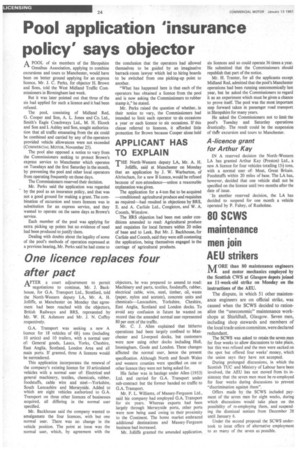One licence replaces four after pact
Page 26

If you've noticed an error in this article please click here to report it so we can fix it.
AFTER a court adjournment to permit negotiations to continue, Mr. _T. Backhouse, for G.A. Transport Ltd., Stretford, told the North-Western deputy LA, Mr. A. H. Jolliffe, at Manchester on Monday that agreement had been reached with the objectors, British Railways and BRS, represented by Mr. W. H. Ashmore and Mr. J. N. Coffey respectively.
G.A. Transport was seeking a new A licence for 18 vehicles of 681 tons (including 10 artics) and 10 trailers, with a normal user of: General goods, Lanes, Yorks, Cheshire, East Anglia, Scotland, London Area and all main ports. If granted, three A licences wouldbe surrendered.
This application incorporates the renewal of the company's existing licence for 10 articulated vehicles with a normal user of: Electrical and general machinery, textiles, chemicals, rubber, foodstuffs, cable wire and steel—Yorkshire, South Lancashire and Merseyside. Added to which are eight vehicles authorized to G.A. Transport on three other licences of businesses acquired, all differing in the normal user specified.
Mr. Backhouse said the company wanted to amalgamate the four licences, with but one normal user. There was no change in the vehicle position. The point at issue was the normal user, which, by agreement with the objectors, he was prepared to amend to read: Machinery and parts, textiles, foodstuffs, rubber, electrical cable, wire, steel, timber, oil, waste (paper, nylon and acetate), concrete units and chemicals—Lancashire, Yorkshire, Cheshire, East Anglia, Scotland and London docks. To avoid any confusion in future he wanted on record that the amended normal user represented 80 per cent of the traffic.
Mr. C. J. Allen explained that hitherto operations had been largely confined to Manchester and Liverpool docks, but customers were now using other docks including Hull, Immingham, Goole and London. These changes affected the normal user, hence the present specification. Although North and South Wales and western counties were specified on one or other licence they were not being asked for.
His father was in haulage under Allen (1953) Ltd. and carried for G.A. Transport under sub-contract but the former handed no traffic to G.A. Transport.
Mr. F. L. Williams, of Massey-Ferguson Ltd., said his company had employed G.A. Transport for six years. Whereas exports had been largely through Merseyside ports, other ports were now being used owing to their proximity to the Continent. The home market embraced additional destinations and Massey-Ferguson business had increased.
Mr. Jolliffe granted the amended application.








































































































